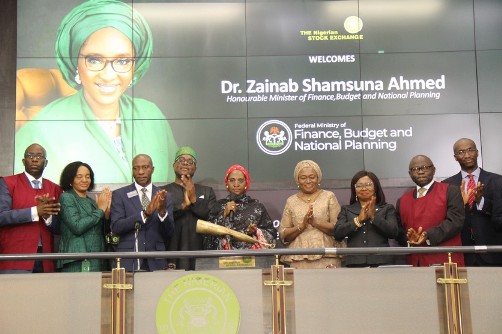
Jide Akintunde, Managing Editor/CEO, Financial Nigeria International Limited
Follow Jide Akintunde
![]() @JSAkintunde
@JSAkintunde
Subjects of Interest
- Financial Market
- Fiscal Policy
As the Nigerian stock market diverges from the real economy 09 Feb 2021

Nigerian finance minister Zainab Ahmed (centre) and other officials during her visit to the Nigerian
Stock Exchange in Feb. 2020
The main index of the Nigerian Stock Exchange (NSE), All Share Index (ASI), grew by 50.02 per cent in 2020. In a sharp contrast, the aggregate value of the economy contracted by 4 per cent, according to the projection by the World Bank. Indeed, last year was a year of winners and losers, notwithstanding the general economic disruptions of the COVID-19 pandemic.
The divergence in Nigeria’s market and economic data was not entirely dissimilar to global trends. Economic and market data divaricated among, and within, countries. Asia’s hi-tech export powerhouses – China, Taiwan (a Chinese territory) and South Korea – responded quickly and effectively to the coronavirus disease outbreak and posted better GDP growth rates compared to other major economies. Within equity markets, tech stocks were prominent among the best performers.
Despite the general trend of decoupling, the disparity in economic performance in Nigeria requires close scrutiny. The country floundered with its COVID-19 response. And, whereas many business activities moved online, the major tech infrastructure being used were foreign. In fact, no tech firm is listed on the Premium and NSE 30 sub-indexes of the Nigerian Stock Exchange.
What, then, drove the outstanding growth of the ASI? The sub-indexes of the NSE grew generally, with quite notable exceptions of the Banking and Oil & Gas sub-indexes. It is hardly surprising that these were the outliers. The profitability of oil companies was directly impacted by the slump in oil prices. The oil and gas sector also accounted for 26 per cent of the total bank lending as of April 2020.
Investors with well-diversified portfolios in Nigerian equities certainly got handsome returns last year. But as Forbes’ list of Africa's Richest People 2021 shows, the cement moguls, Aliko Dangote and Abdul Samad Rabiu, were major beneficiaries of the ASI growth. The share price of Dangote’s eponymous cement company appreciated by about 30 per cent and the richest African got richer by $2 billion. On his part, Rabiu’s wealth grew by 77 per cent. The market value of his BUA Cement had doubled by year-end, after listing on the NSE in January 2020. The other Nigerian to make the Forbes’ list is Mike Adenuga, but his GSM company, Globalcom, remains private.
Despite the eye-catching growth, the ASI closed 2020 at 40,270.07 points, which was 60.8 per cent the peak value of the index in March 2008, before collapsing spectacularly as the contagious effect of the Global Finance Crisis hit the country. Therefore, the NSE has significant scope for growth; the Nigerian economy and the stock market having further diversified in the aftermath of the GFC.
But the main impetus for the NSE’s performance may be the collateral effect of recent policies by the Central Bank of Nigeria (CBN). The apex bank restricted access to its Open Market Operations (OMO) auctions to banks and foreign portfolio investors. By increasing the Loan-to-Deposit Ratio (LDR) to 65 per cent, the CBN roused increased lending to the real sector. But the policy also led to a reduction in interest rate for savings deposits, thereby discouraging savings. Inevitably, the stock market became the only game in town for most local investors and savers.
The policies by which the CBN aimed to encourage investment in the real economy also had the opposite effect of fuelling speculative investments in the stock market. The average return on equity investments in the stock market last year was well above the inflation rate; it was also above the rate at which the naira depreciated in value. There couldn’t be a better encouragement of speculative portfolio investment than this. Therefore, as of January 25, the ASI had grown by 1.8 per cent in 2021.
It is counterproductive for the stock market to run far ahead of the real economy. This scenario creates very few big winners – who would continue to win – and leaves the majority of the people behind as unemployed, poor, and politically disaffectioned.
The Nigerian economy needs to work for most of the people and not only for very few of them. Too much regulation is not the way to achieve this. Therefore, the CBN needs to retreat from over-regulation of the investment markets; too much regulation has been counter-productive in the FX market. As the CBN deepens its penchant for interventions and control of the functioning of markets, so has its responsibility for Nigeria’s economic dysfunction. The concern that the central bank’s LDR policy may fuel loan delinquency is also being realised.
Equally important is the need for substantial stimulus spending, directed at enabling consumption. There has been no money for this because the government has yet to take poverty alleviation as seriously as it should.





